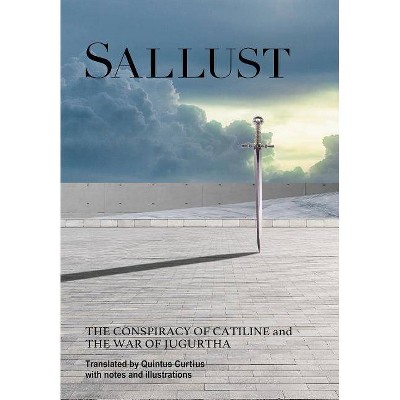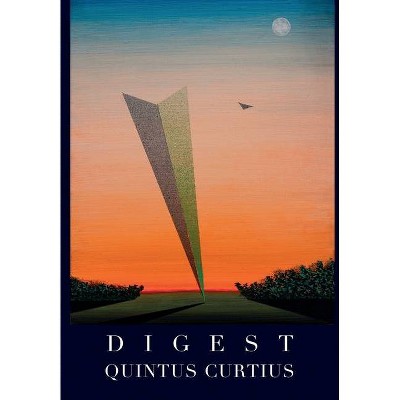On Moral Ends - Annotated by Quintus Curtius (Hardcover)

Similar Products
Products of same category from the store
AllProduct info
<p/><br></br><p><b> About the Book </b></p></br></br>This new translation of Cicero's philosophical classic "On Moral Ends" is unlike any other previous translation. Illustrated with original photographs and entirely annotated, it brings this great work to a new generation of readers.<p/><br></br><p><b> Book Synopsis </b></p></br></br><p>This new and original translation of Cicero's "On Moral Ends" (De Finibus) contains numerous unique features that make it ideal for the motivated self-learner or for classroom use. Fully self-contained, it is designed both for the serious student and for those who have no prior background in classical studies. Special features include the following: </p><p>1. A clear, modern, and accurate translation gained from intensive study of the Latin text.</p><p>2. Sixty-five (65) original photographs, taken by the translator, of the actual locations where the dialogues took place in Italy and Greece (Cumae and Tusculum in Italy, the Platonic Academy in Athens, and other historical sites in Athens). These photos enhance comprehension and appreciation of the text.</p><p>3. Over four hundred sixty scholarly footnotes that explain every name, concept, and detail needed for comprehension.</p><p>4. Detailed topical organization table for easy, fast location of topics and issues.</p><p>5. Detailed descriptive index.</p><p>6. Extended introduction that explains the author's life and works, the organization and layout of the text, and summaries of the three philosophical systems discussed by Cicero.</p><p>7. Commentaries at the end of each of the five books that assist the reader in understanding the text.</p><p>The essential question asked in "On Moral Ends" is this: what is the ultimate end or goal of human life that provides us with a rational plan for living? In a series of stimulating dialogues, Cicero examines three philosophical systems and attempts to arrive at a theory of ethics to govern life. In so doing, he eloquently voices his surpassing belief in the power of wisdom, nature, and the human soul. Until now this essential work has not been as accessible to the modern reader as it should be. This is a translation for the new millenium, and seeks to make the text accessible to a new generation of readers.</p><p>Quintus Curtius is a translator, writer, and attorney. He has previously translated Cicero's "On Duties," "Stoic Paradoxes," as well as the works of the Roman historian Sallust. He can be found at www.qcurtius..com.</p><p/><br></br><p><b> Review Quotes </b></p></br></br><br><p>"With most classical translations you purchase a book, get a quick introduction (if you are lucky), and then plunge straight into text. Often you find that, while the text is in English, it doesn't feel that way. There isn't the flow of words you experience with a talented writer. You may also notice that there are words, phrases, and references that don't make sense. So you have a choice: slog through and do the best you can, put the book down and read someone else's interpretation, or just assume reading classical philosophy is too difficult to understand, too alien from today's world.<br /> <br /> With this version of On Moral Ends, however, none of these problems exist. The translation is top notch and compares very favorably to other versions of On Moral Ends I have reviewed. We must remember that Cicero was one of the finest lawyers in the Roman Republic and certainly the best orator in history. On top of that, Cicero believed in the spirit of the Roman Republic and fought for it with his voice and his words. Recall that Quintus Curtius is a practicing trial lawyer, just like Cicero was, and is also a United States Marine. Quintus, through his personal vocations, understands the mentality of a man who steadfastly serves his nation and the way an attorney prepares a case that will be decided by a jury. No other translator has offered such a similar understanding of Cicero. And it shows when we read the text.<br /> <br /> This volume also includes 461 footnotes that explain critical references or point out important items. There is a foreword that explains the structure of the book and an introduction that provides a concise overview of Cicero, his works, and the three major philosophical schools that are to be reviewed. After each of Cicero's 'books' (we'd call the chapters) Quintus has written a commentary to sum up what we've read.<br /> <br /> A unique spin is given on the table of contents--Quintus has marked the text with subsections and has given a one to three line overview of the subject addressed within the subsection. This allows a student to easily reference a specific part of the text or obtain a bare-bones understanding of the entire book in 9 pages. Anyone interested in philosophy will immediately want this feature in every philosophic book he or she reads in the future.<br /> <br /> Another feature present in this translation and no others is unique photography and illustrations. Quintus Curtius travelled to Italy and Greece specifically to walk the path of Cicero and photograph what he found. He then strategically placed these pictures (as well as some illustrations) throughout the text. This has a positive effect on the reader and helps to refresh one's mind as we are trying to understand the complex topics at hand. They also offer flavor--we can see the natural beauty of places Cicero walked and get a sense of how this impacted his writing. I imagine this had a positive impact on the translation as well.<br /> <br /> Overall, this is a fabulous book and should be the minimum standard for translations. If both current and future Classicists used this arrangement as a template and put as much effort into staying true to the voice and spirit of the original author, perhaps it wouldn't be so difficult to get people to review the critical wisdom of those who created Western Civilization.<br /> <br /> Quintus Curtius should be commended for the care and dedication he put into this volume. He has successfully bridged a two thousand year cultural gap and helped one of our most beloved ancestors feel like our contemporary. Do yourself a favor and choose this version. You will not be disappointed."</p><br>
Price History
Price Archive shows prices from various stores, lets you see history and find the cheapest. There is no actual sale on the website. For all support, inquiry and suggestion messagescommunication@pricearchive.us




















